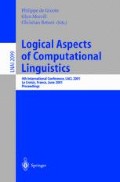Abstract
This paper presents logical reconstructions of four different methods for part of speech tagging: Finite State Intersection Grammar, HMM tagging, Brill tagging, and Constraint Grammar. Each reconstruction consists of a first-order logical theory and an inference relation that can be applied to the theory, in conjunction with a description of data, in order to solve the tagging problem. The reconstructed methods are compared along a number of dimensions including ontology, expressive power, mode of reasoning, uncertainty, underspecification, and robustness. It is argued that logical reconstruction of NLP methods in general can lead to a deeper understanding of the knowledge and reasoning involved, and of the ways in which different methods are related.
Access this chapter
Tax calculation will be finalised at checkout
Purchases are for personal use only
Preview
Unable to display preview. Download preview PDF.
References
Brill, E. (1995) Transformation-Based Error-Driven Learning and Natural Language Processing: A Case Study in Part of Speech Tagging. Computational Linguistics 21, 543–565.
Charniak, E. (1997) Statistical Techniques for Natural Language Parsing. AI Magazine 18(4), 33–44.
Fernández, J. A. and Minker, J. (1992) Disjunctive Deductive Databases. In Proceedings of the Logic Programming and Automated Reasoning Conference.
Karlsson, F., Voutilainen, A., Heikkilä, J., Anttila, A. (eds) (1995) Constraint Grammar: A Language-Independent System for Parsing Unrestricted Text. Mouton de Gruyter.
Koskenniemi, K. (1990) Finite-State Parsing and Disambiguation. In Proceedings of COLING’90, Helsinki, Finland.
Lager, T. (1998) Logic for Part of Speech Tagging and Shallow Parsing. In Proceedings of NODALIDA’98, Copenhagen, Denmark.
Lager, T. (1999) The μ-TBL System: Logic Programming Tools for Transformation-Based Learning. In Proceedings of CoNLL’99, Bergen, Norway.
Lager, T. (2000) A Logic Programming Approach to Word Expert Engineering. In Proceedings of ACIDCA 2000: Workshop on Corpora and Natural Language Processing, Monastir, Tunisia.
Levesque, H. and Brachman, R. (1985) A Fundamental Tradeoffin Knowledge Representation and Reasoning. In Brachman, R. and Reiter, H. (eds) Readings in Knowledge Representation. Morgan Kaufman.
Poole, D. (1993a) Probabilistic Horn Abduction and Bayesian Networks. Artificial Intelligence 64(1), 81–129.
Poole, D. (1993b) Logic Programming, Abduction and Probability: A Top-Down Anytime Algorithm for Computing Prior and Posterior Probabilities. New Generation Computing, 11(3-4), 377–400.
Seipel, D. and Thöne, H. (1994) DisLog — A System for Reasoning in Disjunctive Deductive Databases. In Proceedings of the International Workshop on the Deductive Approach to Information Systems and Databases 1994 (DAISD’94).
Tapanainen, P. and Voutilainen, A. (1994) Tagging Accurately — Don’t Guess If You Know. In Proceedings of the Fourth Conference on Applied Natural Language Processing, Stuttgart, Germany.
Viterbi, A. J. (1967) Error Bounds for Convolutional Codes and an Asymptotically Optimal Algorithm. IEEE Transactions on Information Theory IT-13(2), 260–269.
Author information
Authors and Affiliations
Editor information
Editors and Affiliations
Rights and permissions
Copyright information
© 2001 Springer-Verlag Berlin Heidelberg
About this paper
Cite this paper
Lager, T., Nivre, J. (2001). Part of Speech Tagging from a Logical Point of View. In: de Groote, P., Morrill, G., Retoré, C. (eds) Logical Aspects of Computational Linguistics. LACL 2001. Lecture Notes in Computer Science(), vol 2099. Springer, Berlin, Heidelberg. https://doi.org/10.1007/3-540-48199-0_13
Download citation
DOI: https://doi.org/10.1007/3-540-48199-0_13
Published:
Publisher Name: Springer, Berlin, Heidelberg
Print ISBN: 978-3-540-42273-0
Online ISBN: 978-3-540-48199-7
eBook Packages: Springer Book Archive

